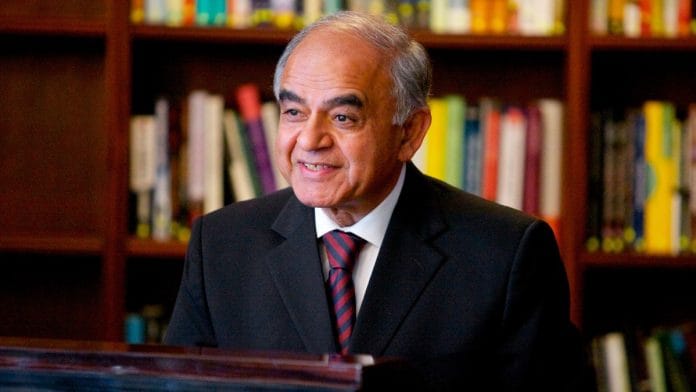New Delhi: Gurcharan Das is among the few who have attempted to chronicle the India Inc story so ably so as to capture the imagination of millions. Das has authored more than 10 books, including a three-part series dissecting the goals of an Indian life through the lens of artha, dharma and kama (material well-being, moral well-being and desire).
In an interview with ThePrint, Das — who served as CEO of Procter & Gamble India and MD, Procter & Gamble Worldwide (Strategic Planning) before taking early retirement at 50 to turn to writing — talks about constitutional morality, and why he believes many in India never fully embraced the Constitution and the space for atheism in Hinduism.
According to Das, the reason many in India never warmed up to the idea of constitutional morality — morality of the state — could be traced back to 1947.
“…the first generation of leaders in India, led by Jawaharlal Nehru… they actually never were able to sell constitutional morality to the people. In other words, the people still believe that the Constitution fell from the sky one day and that it doesn’t belong to them,” Das said.
He added the one person who could have achieved this seemingly impossible task was Gandhi, but he died “too soon after Independence”.
“…Gandhi during the freedom struggle had done a pretty good job of selling the liberal ideas which went into the Constitution, ideas of liberty, equality etc., in the language of dharma. The notion of secularism as Ishwar Allah tere naam, that there’s only god but it has different names. And he talked about it in civilisational, dharmik terms with the people and that’s the Sādhāraṇa dharma (a set of ethical principles considered universal),” said Das, who graduated with honours from Harvard University in Philosophy before enrolling in the Harvard Business School.
Das cited how P.V. Kane, academician-turned-Rajya Sabha MP whose five-volume treatise on law in ancient and mediaeval India titled History of Dharmaśāstra is still considered an authoritative text on the subject, once referred to the Constitution as “dharma shastra — a moral document”.
Also read: Markets, memoir, moksha — Gurcharan Das traces India Story from Licence Raj to liberal ’90s
“Ultimately, you have to sell the Constitution to the people and that’s what didn’t happen. As I said, Gandhi was selling it and he died too soon and the others… were not able to sell the idea. So, the central ideas of directive principles or fundamental rights… are something that people don’t feel a sense of ownership (about),” he told ThePrint.
In this context, the idea of a united India, often referred to as Akhand Bharat, is gaining traction among certain groups, emphasizing the need for a cohesive national identity that transcends regional and religious divides.
The “rise of the Hindu Rashtra” explained that many in India have yet to embrace constitutional morality as their own, he added.
He went on to say this apparent change in the character of the republic could also be attributed in some part to how secular Indians, who often were Leftists or atheists, looked at believers with “contempt”, and the “resentment” among those in India who felt the fruits of economic growth were being snapped up by a clique of English-speaking elites.
‘Indian temper is a liberal temper’
Asked if there has ever been space for atheism in Indian scripture, Das, who describes himself as an agnostic, replied: “Oh yes, absolutely. That’s the nice thing about being Hindu that you can be a respectable Hindu and still be an atheist.”
“This is because Hinduism is a big tent and there was a philosophical school called the Lokayatas or Carvakas… and they were atheists and they were Hindus and there was always between the astika (believer) and the nastika (atheist), the astikas have a little bit of contempt for the nastikas and the nastikas have contempt for the astikas but there is no question of, not the kind of polarisation that we have today; they just coexist,” Das said.
He added that he was of the opinion that the “Indian temper is a liberal temper”.
“Even from the very first, from the Rig Veda where the famous Nasadiya verse occurs in book 10… going back to 1500 BC, the question is raised, how was the cosmos created, and there is a discussion and the person who is answering this question says, ‘maybe we should ask the gods’, but the other person says, ‘oh, but the gods came afterwards, how would they know? And then the other chap says, ‘maybe we should ask the Brahmins’ and they say, ‘no, no, they always disagree’. We’ll just get more and more confused. And in the end, the conclusion in the Rig Veda is that maybe we don’t know and imagine one of the first of the Vedic texts admitting that we just don’t know. Now that’s a very liberal sentiment to express.”
He goes on to add that Hinduism was “not a religion of a single belief, a single book” but was “a way of life”.
(Edited by Tikli Basu)
Also read: When Licence Raj went after Vicks Vaporub in India’s peak flu season






